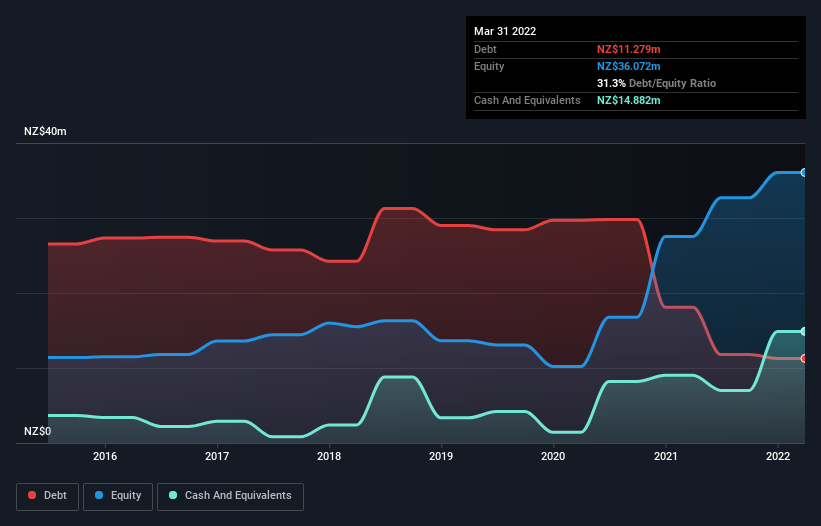We Think Smartpay Holdings (NZSE:SPY) Can Stay On Top Of Its Debt
David Iben put it well when he said, 'Volatility is not a risk we care about. What we care about is avoiding the permanent loss of capital.' So it might be obvious that you need to consider debt, when you think about how risky any given stock is, because too much debt can sink a company. We note that Smartpay Holdings Limited (NZSE:SPY) does have debt on its balance sheet. But should shareholders be worried about its use of debt?
Why Does Debt Bring Risk?
Debt assists a business until the business has trouble paying it off, either with new capital or with free cash flow. If things get really bad, the lenders can take control of the business. However, a more common (but still painful) scenario is that it has to raise new equity capital at a low price, thus permanently diluting shareholders. Of course, debt can be an important tool in businesses, particularly capital heavy businesses. When we think about a company's use of debt, we first look at cash and debt together.
View our latest analysis for Smartpay Holdings
How Much Debt Does Smartpay Holdings Carry?
You can click the graphic below for the historical numbers, but it shows that Smartpay Holdings had NZ$11.3m of debt in March 2022, down from NZ$18.1m, one year before. However, its balance sheet shows it holds NZ$14.9m in cash, so it actually has NZ$3.60m net cash.
A Look At Smartpay Holdings' Liabilities
The latest balance sheet data shows that Smartpay Holdings had liabilities of NZ$19.9m due within a year, and liabilities of NZ$14.7m falling due after that. Offsetting these obligations, it had cash of NZ$14.9m as well as receivables valued at NZ$2.57m due within 12 months. So its liabilities total NZ$17.1m more than the combination of its cash and short-term receivables.
Given Smartpay Holdings has a market capitalization of NZ$160.8m, it's hard to believe these liabilities pose much threat. However, we do think it is worth keeping an eye on its balance sheet strength, as it may change over time. Despite its noteworthy liabilities, Smartpay Holdings boasts net cash, so it's fair to say it does not have a heavy debt load!
We also note that Smartpay Holdings improved its EBIT from a last year's loss to a positive NZ$3.1m. When analysing debt levels, the balance sheet is the obvious place to start. But it is future earnings, more than anything, that will determine Smartpay Holdings's ability to maintain a healthy balance sheet going forward. So if you're focused on the future you can check out this free report showing analyst profit forecasts.
Finally, a business needs free cash flow to pay off debt; accounting profits just don't cut it. While Smartpay Holdings has net cash on its balance sheet, it's still worth taking a look at its ability to convert earnings before interest and tax (EBIT) to free cash flow, to help us understand how quickly it is building (or eroding) that cash balance. Happily for any shareholders, Smartpay Holdings actually produced more free cash flow than EBIT over the last year. That sort of strong cash conversion gets us as excited as the crowd when the beat drops at a Daft Punk concert.
Summing up
While Smartpay Holdings does have more liabilities than liquid assets, it also has net cash of NZ$3.60m. And it impressed us with free cash flow of NZ$3.2m, being 104% of its EBIT. So we don't have any problem with Smartpay Holdings's use of debt. The balance sheet is clearly the area to focus on when you are analysing debt. But ultimately, every company can contain risks that exist outside of the balance sheet. Case in point: We've spotted 2 warning signs for Smartpay Holdings you should be aware of.
At the end of the day, it's often better to focus on companies that are free from net debt. You can access our special list of such companies (all with a track record of profit growth). It's free.
Have feedback on this article? Concerned about the content? Get in touch with us directly. Alternatively, email editorial-team (at) simplywallst.com.
This article by Simply Wall St is general in nature. We provide commentary based on historical data and analyst forecasts only using an unbiased methodology and our articles are not intended to be financial advice. It does not constitute a recommendation to buy or sell any stock, and does not take account of your objectives, or your financial situation. We aim to bring you long-term focused analysis driven by fundamental data. Note that our analysis may not factor in the latest price-sensitive company announcements or qualitative material. Simply Wall St has no position in any stocks mentioned.

